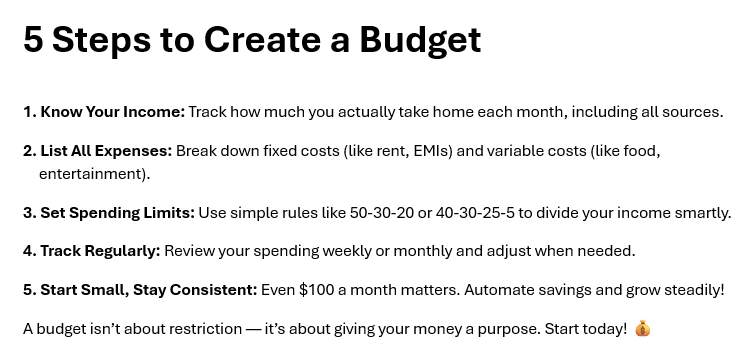Managing your money well begins with one important habit — budgeting. A budget is simply a plan for your money. It helps you keep track of what you earn, what you spend, and what you save. Having a budget gives you better control over your finances and helps you build a strong foundation for the future.
The first step is to understand your income. Find out exactly how much money you bring home every month after taxes and deductions. Include all sources such as your salary, freelance work, rental income, or any side business. Knowing your real income is the starting point for any budget.
Next, list all your expenses. Divide them into two types: fixed expenses like rent, loan EMIs, and insurance premiums, and variable expenses like groceries, entertainment, travel, and dining out. Be honest and detailed while listing them. Checking past bank statements or payment app histories can help you find hidden costs.
Once you know your income and expenses, set clear spending limits. Many experts and books suggest simple rules of thumb to help you start. One popular method is the 50-30-20 rule — 50% for needs, 30% for wants, and 20% for savings and debt repayment. Another example is the 40-30-25-5 rule — 40% for housing, 30% for lifestyle expenses, 25% for investments and loan EMIs, and 5% for charity. There are various other methods also. Perhaps the best one would be to sit and create this for yourself.
Please discuss it with a financial advisor or your partner or think it through before choosing a method that suits your situation. Still, the most important thing is to ensure that saving becomes a regular habit.
It’s important to track your spending regularly, either weekly or monthly. Free apps or even a simple notebook can help you stay on course. Setting up automatic savings transfers can also make saving easier and more consistent.
Remember, budgeting is not about cutting out all enjoyment. Allow some space for small treats and unexpected expenses.
Most importantly, start with whatever amount you can. Even saving $50 a month or 5–10% of your income is a good beginning. Over time, budgeting will become a natural part of your life, helping you move closer to your financial goals with less stress.

